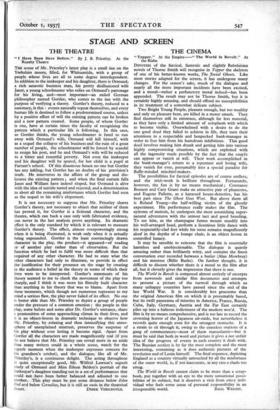STAGE AND SCREEN
THE THEATRE
I Have Been Here Before." By J. B. Priestley. At the Royalty Theatre
THE scene of Mr. Priestley's latest play is a small inn on the Yorkshire moors, filled, for Whitsuntide, with a group of people whose lives are all to some degree interdependent. In addition to the innkeeper and his daughter, there is Ormund, a rich neurotic business man, his pretty disillusioned wife Janet, a young schoolmaster who relies on Ormund's patronage for his living, and—most important—an exiled German philosopher named Gortler, who comes to the inn with the purpose of verifying a theory. Gortler's theory, reduced to a summary, is this : events naturally repeat themselves, and every human life is destined to follow a predetermined course, unless by a positive effort of will the existing pattern can be broken and a new pattern created. Some people, of whom Gortler is one, have at certain times the faculty of recognising the pattern which a particular life is following. In this case, so Gortler thinks, the young schoolmaster is fated to run away with Ormund's wife, Ormund will kill himself, with as a sequel the collapse of his business and the ruin of a great number of people, the schoolmaster will be forced by scandal to resign his post, and he and Ormund's wife will be reduced to a bitter and resentful poverty. Not even the innkeeper and his daughter will be spared, for her child is a pupil at Farrant's school. Of this disastrous future no one but Gortler has any inkling, but Gortler has no doubts of his prevision's truth. He intervenes in the affairs of the group and dis- locates the existing pattern ; and when the final curtain falls Janet and William have indeed eloped, but 0 rmtmd is alive with the idea of suicide tested and rejected, and a determination to abort all the remaining misfortunes which Gortler had seen as the sequel to his wife's elopement.
It is not necessary to suppose that Mr. Priestley shares Gortler's theory, not necessary to object that neither of them has proved it, for Gortler is a fictional character, and the theatre, which can back a case only with fabricated evidence, can never in the last analysis prove anything. Its dramatic effect is the only standard by which it is relevant to measure Gortler's theory. The effect, almost overpoweringly strong when it is being illustrated, is weak only when it is actually being expounded. Gortler is the least convincingly drawn character in the play, the product—it appeared—of reading or of another play rather than of observation. But the function which he had to fulfil was more difficult than that required of any other character. He had to state what the other characters had only to illustrate, to provide in effect the justification for their presence on the stage by creating in the audience a belief in the theory in terms of which their lives were to be interpreted. Gortler's statements of his theory seemed to me to check the movement of the play too sharply, and I think it was more his flimsily built character than anything in his theory that was to blame. Apart from these moments, which though not numerous represent to my mind a serious flaw, the play never failed of its effect. No one is better able than Mr. Priestley to depict a group of people under the pressure of a common emotion ; the people in this play, some before and some after Dr. Gortler's entrance, share a premonition of some approaching climax in their lives, and it is an object-lesson in dramatic technique to observe how Mr. Priestley, by -relaxing and then intensifying this atmo- sphere of unexplained mistrust, preserves the suspense of his play without ever letting it become rigid. Apart from Gortler all the characters are made magnificently real (if you do not believe that Mr. Priestley can reveal more in an aside than many writers could in a whole scene, watch for the superb moment when the innkeeper expresses concern for his grandson's cricket), and the dialogue, like all of Mr. Priestley's, is a continuous delight. The acting throughout is quite exceptionally good, Mr. Wilfrid. Lawson's superb study of Ormund and Miss Eileen Beldon's portrait of the innkeeper's daughter standing out in a set of performances that could not . have been better balanced and adjusted to one another. This play must be put some distance .below Eden End and below Cornelius, but it is still an oasis in the theatrical






































 Previous page
Previous page